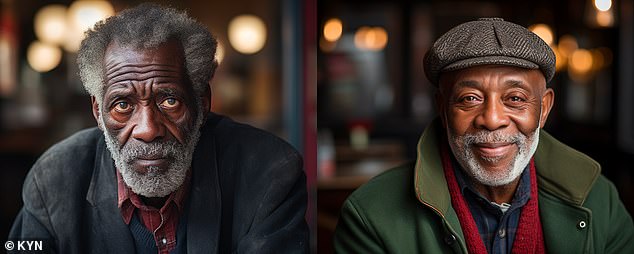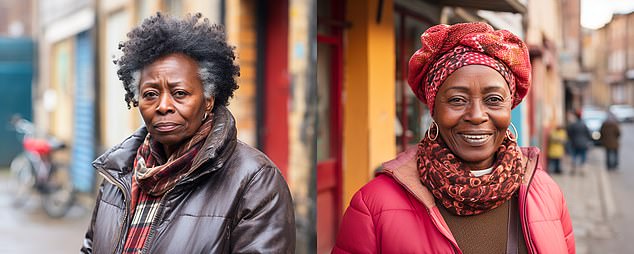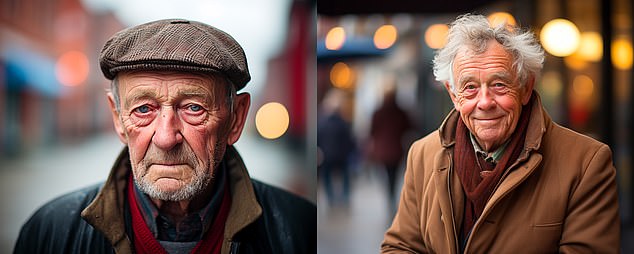Revealed: What Brits think ‘older people’ look like (with VERY different results depending on your age!)
If you were asked to imagine an “older person,” what would come to mind?
According to a new study, the answer depends heavily on your own age.
Healthcare organization KYN asked more than 1,000 people to describe an elderly person, before feeding their results into the AI art generator Midjourney to bring them to life.
The results show that people between the ages of 18 and 69 consider older people as frail, tired and vulnerable.
People over 70, on the other hand, see older people as friendly, knowledgeable and smart.
If you were asked to imagine an “older person,” what would come to mind? According to a new study, the answer depends heavily on your own age. Left in the photo: an older person according to 18 to 69 year olds, right: an older person according to the 70+ group

Healthcare organization KYN asked more than 1,000 people to describe an elderly person, before feeding their results into the AI art generator Midjourney to bring them to life. Left in the photo: an older person according to 18 to 69 year olds, right: an older person according to the 70+ group
For the survey, KYN asked 1,663 Britons what they think about the elderly in Great Britain.
The results showed that 68 percent of people over the age of 70 believe the reality of their lives conflicts with how younger generations see them.
Although this older group recognized the challenges of growing older, they were significantly more optimistic than younger people.
For example, only nine percent of people over 70 say they worry about not being happy later in life, compared to 21 percent of people aged 18 to 69.
The results also showed that people over 70 feel lonely significantly less often than people under 70.
Of 18 to 69 year olds, 70 percent say they often feel lonely, compared to 35 percent of those over 70.
When asked to describe later life, younger age groups were much more likely to choose words that connoted negativity and limitations.
These included ‘vulnerable’, ‘tired’, ‘grumpy’, ‘vulnerable’ and ‘naive’.
In contrast, over-70s describe their own age group with much more optimistic terms, including ‘knowledgeable’, ‘interesting’, ‘friendly’, courteous’, ‘caring’, ‘smart’, ‘social’, ‘relaxed’ and ‘patient’.

When asked to describe later life, younger age groups were significantly more likely to choose words that connoted negativity and limitations. Left in the photo: an older person according to 18 to 69 year olds, right: an older person according to the 70+ group

Over-70s described their own age group using much more optimistic terms, including ‘knowledgeable’, ‘interesting’, ‘friendly’, courteous’, ‘caring’, ‘smart’, ‘social’, ‘relaxed’ and ‘patient’. Left in the photo: an older person according to 18 to 69 year olds, right: an older person according to the 70+ group
To highlight this bias, KYN used Midjourney to create two versions of portraits of four older people, based on the descriptions of each age group.
In particular, the versions envisioned by the younger group look unhappy and tired, while the versions created by the older group look cheerful and radiant.
Caroline Naidoo, Managing Director of KYN said: ‘We commissioned this research to really understand the realities of later life and what it means to be seen as ‘old’ today.
‘Unfortunately, as we get older, we may ultimately be defined by our age – but we are so much more than just a number.
‘People’s past experiences, current interests and future wishes are still as relevant in later life as ever before.’
KYN hopes the research will highlight the harmful impact of stereotyping people based on their age.
“We hope this research will make everyone sit up and take note of these findings – whether they work in the care sector or see older relatives in a new light,” Ms Naidoo added.
‘Together we can destigmatize later life.’
